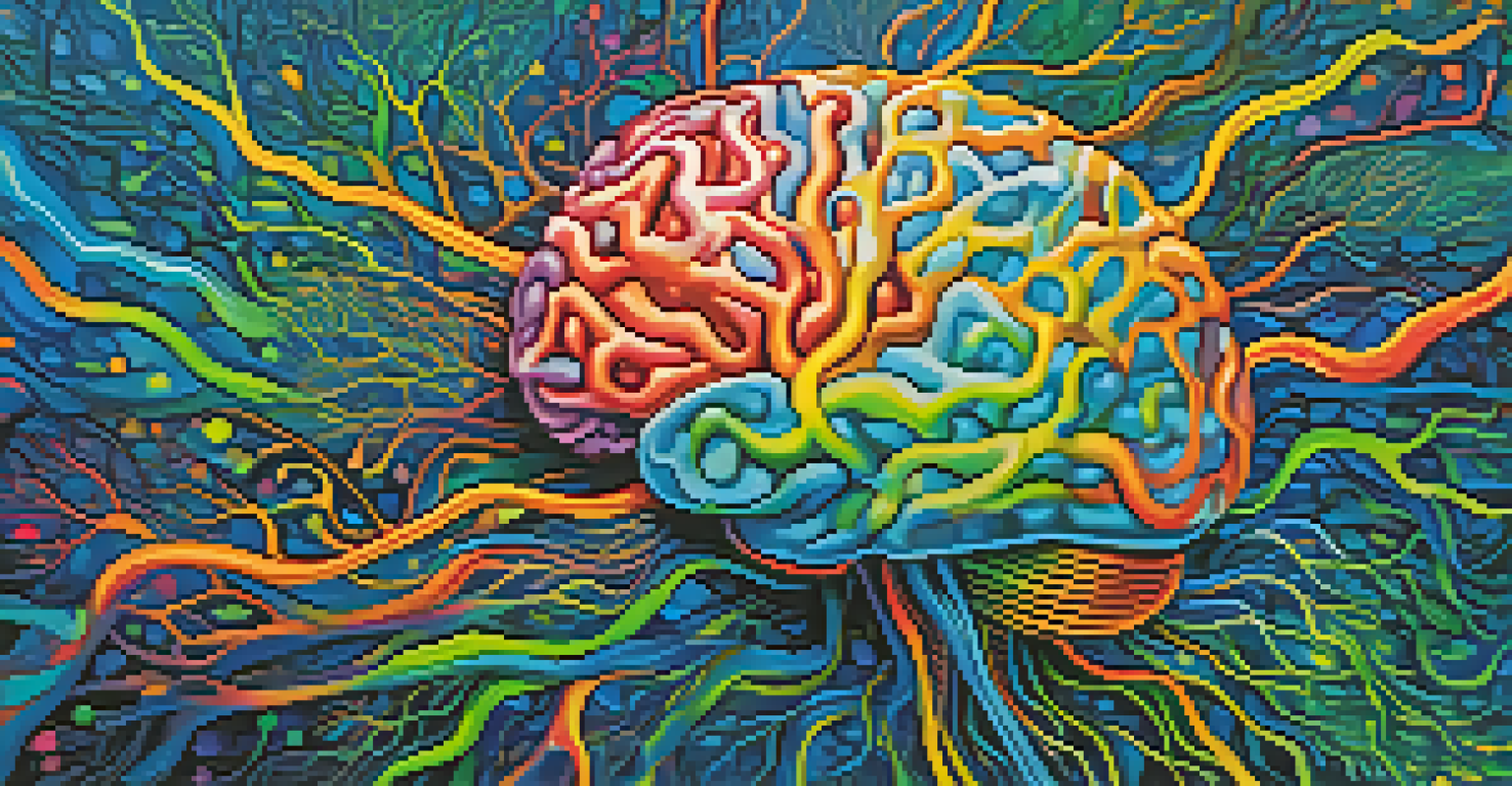MDMA and Memory: Its Role in Therapeutic Contexts

Understanding MDMA: A Brief Overview
MDMA, commonly known as ecstasy, is a psychoactive drug that alters mood and perception. Originally developed in the early 20th century, it gained popularity in the 1980s as a recreational substance. However, researchers are now exploring its potential therapeutic uses, especially in treating PTSD and anxiety. By understanding how MDMA works in the brain, we can better appreciate its role in memory and emotional processing.
MDMA has the potential to help individuals confront their trauma and process their emotions in a way that traditional therapies may not allow.
When ingested, MDMA increases the release of neurotransmitters like serotonin, dopamine, and norepinephrine. This surge creates feelings of euphoria and emotional closeness, which can be particularly beneficial in a therapeutic context. For many participants, this heightened emotional state can lead to deeper discussions and insights during therapy sessions. Thus, MDMA’s effects on mood are intricately linked to how memories are processed and recalled.
Moreover, this drug can help patients confront traumatic memories without becoming overwhelmed. By reducing fear and anxiety associated with these memories, MDMA allows individuals to reprocess them in a safer emotional environment. This unique aspect of MDMA makes it a valuable tool for therapists aiming to guide patients through their healing journeys.
MDMA and Memory Formation: How It Works
Memory formation is a complex process involving encoding, storage, and retrieval. MDMA influences these stages by enhancing emotional engagement during memory encoding. This means that experiences felt under the influence of MDMA may be memorized more vividly due to the emotional intensity they evoke. As a result, patients might recall therapy sessions more clearly, leading to more effective treatment outcomes.

Additionally, MDMA seems to facilitate the integration of new memories with existing ones. This could help individuals reinterpret past experiences with a fresh perspective. For instance, a traumatic memory may be recontextualized when paired with feelings of safety and connection fostered by MDMA. Such a reframing can significantly impact a patient’s ability to cope with their trauma moving forward.
MDMA's Role in Therapy
MDMA helps patients confront traumatic memories by reducing anxiety, enhancing emotional connection, and facilitating deeper discussions during therapy.
However, it’s important to note that while MDMA enhances certain memory processes, it may not be suitable for everyone. Individual responses to the drug can vary widely, and not all patients may experience the same benefits. Understanding these nuances is crucial for therapists considering MDMA-assisted therapy as a treatment option.
The Therapeutic Benefits of MDMA in Treating PTSD
One of the most researched applications of MDMA is in the treatment of post-traumatic stress disorder (PTSD). Traditional therapies often require patients to revisit painful memories, which can be distressing. MDMA helps alleviate that distress, allowing patients to face their trauma with less fear. This reduction in anxiety can lead to more productive therapy sessions, where patients can openly discuss their feelings and experiences.
The therapeutic use of MDMA is about creating a safe space for patients to explore their emotional memories.
Clinical trials have shown promising results, with many participants reporting a significant decrease in PTSD symptoms after MDMA-assisted therapy. For example, a study found that around 68% of participants no longer qualified for PTSD diagnosis after receiving MDMA therapy. This high success rate highlights the drug's potential as a breakthrough treatment for those struggling with the debilitating effects of trauma.
The ability of MDMA to foster empathy and emotional connection can also enhance the therapeutic relationship between the patient and the therapist. This bond can be crucial in facilitating healing and growth, as patients often feel more comfortable sharing their innermost thoughts and feelings. As a result, MDMA not only aids in memory processing but also transforms the therapeutic experience itself.
MDMA's Role in Enhancing Emotional Memory Recall
Emotional memories are often more vivid and easier to recall than neutral ones, and MDMA appears to amplify this effect. Under its influence, individuals may find it easier to access emotional memories, which can be particularly helpful in therapeutic settings. This enhanced recall can lead to more profound insights during therapy, as patients connect past experiences with their current emotional states.
Moreover, the drug's capacity to evoke feelings of love and connection can enable patients to approach difficult memories from a place of safety. This emotional buffer allows for a deeper exploration of painful experiences without the overwhelming anxiety typically associated with them. By creating a supportive emotional environment, MDMA facilitates a more profound understanding of how past events shape present behaviors.
Enhancing Memory with MDMA
The drug enhances emotional engagement during memory formation, leading to clearer recall of therapy sessions and better integration of past experiences.
However, this heightened emotional recall isn't without its challenges. Some individuals may find certain memories too intense or painful to process, even under the influence of MDMA. Therapists must be prepared to navigate these moments, ensuring that patients feel supported and safe as they explore their emotional landscapes.
Potential Risks and Considerations of MDMA Use
While MDMA shows great promise in therapeutic contexts, it is not without risks. Some individuals may experience negative side effects, such as anxiety, paranoia, or even memory impairments after the drug's effects wear off. These risks highlight the importance of thorough screening and careful monitoring during MDMA-assisted therapy sessions. Not every patient may be a suitable candidate for this treatment.
Additionally, MDMA’s impact on memory may lead to potential complications. For instance, patients might create false memories or overly embellish their past experiences while under the drug's influence. It’s crucial for therapists to differentiate between genuine memories and those altered by the drug, ensuring that treatment remains grounded in reality.
These considerations underscore the importance of conducting MDMA therapy within a controlled and professional environment. Collaborations between therapists, researchers, and medical professionals are essential to maximize the benefits of MDMA while minimizing potential risks. As research continues, a clearer understanding of MDMA’s safety and efficacy profile will emerge.
The Science Behind MDMA and Memory Processing
MDMA affects the brain's neurochemistry, particularly in areas responsible for emotion and memory. By increasing serotonin levels, it enhances mood and emotional processing, which can lead to better memory formation. This neurochemical response can create an ideal environment for patients to confront and reprocess traumatic memories during therapy sessions.
Additionally, MDMA appears to promote neuroplasticity, the brain's ability to adapt and reorganize itself. This is particularly important in therapeutic contexts, as it allows individuals to form new, healthier connections related to their trauma. As patients engage with their memories in a supportive environment, their brains may begin to rewire, paving the way for healing and recovery.
Risks of MDMA Therapy
While promising, MDMA therapy carries risks such as anxiety and potential memory distortions, necessitating careful screening and professional oversight.
Research is ongoing, but early findings suggest that the combination of enhanced emotional engagement and neuroplasticity could revolutionize how we approach mental health treatment. By harnessing the science behind MDMA, therapists can potentially offer patients a more effective means of navigating their emotional landscapes.
Looking Ahead: The Future of MDMA in Therapy
As research continues to unfold, the future of MDMA in therapeutic settings looks promising. Ongoing clinical trials are exploring its effectiveness for various mental health conditions beyond PTSD, including depression and anxiety disorders. As our understanding of MDMA's effects on memory and emotion deepens, it may become a more widely accepted treatment option.
Moreover, public perception of MDMA is shifting as awareness of its therapeutic potential grows. Education and advocacy efforts are crucial in promoting responsible use and understanding the drug's benefits and risks. As more professionals embrace MDMA-assisted therapy, the landscape of mental health treatment could change significantly.

Ultimately, the journey of MDMA in therapy represents a broader conversation about the role of psychoactive substances in mental health treatment. As we continue to explore the intersection of science, psychology, and personal healing, MDMA may become a key player in redefining how we approach trauma and emotional well-being.